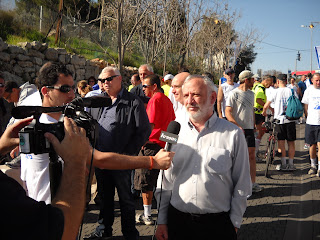Edelstein: Hasbara activists can learn from Begin
By JOSHUA HAMERMAN
"Likud Anglos" hold public diplomacy forum to mark 19 years since former PM’s death.
The keys to successful hasbara (public diplomacy) include a strong belief in the justice of Israel’s cause, never being afraid to repeat the obvious and standing firm over semantics – all of which were characteristic of Menachem Begin, Minister of Public Diplomacy and Diaspora Affairs Yuli Edelstein said at an event held in memory of the former prime minister.
Likud Anglos, an organization serving Anglo members of the Likud Party, sponsored the memorial Sunday evening at the Menachem Begin Heritage Center in Jerusalem. Subsequent memorials for Begin, who died on March 8, 1992, will be put together annually by Likud Anglos close to his yartzeit.
The memorial began with a moment of silence for the victims of the recent terror attacks in Jerusalem and Itamar, and the latest rocket attacks in the South. In his opening address, Daniel Tauber, an oleh from the US and chairman of the Jerusalem chapter of Likud Anglos, said the organization will send a letter to all Likud members of Knesset, urging them to take any actions necessary to prevent an escalation of terrorism.
Tauber also recalled that Begin, after his September 1940 arrest by Soviet authorities in occupied Poland for his activities in the Revisionist Zionist youth movement, Betar, was so particular about semantics that he refused to sign a confession provided by his Soviet interrogator.
In his memoir about his time in Soviet captivity, “White Nights,” Begin wrote that he would not sign the confession, for which he might have received a fair trial and freedom, because it began with the words “I admit I am guilty of…” Begin objected to the word “guilty,” and asked that the wording be changed to, “I admit that I was…” Edelstein, a Likud MK and former Prisoner of Zion, said this incident shows how Begin was conscious of basic inner truths – including the justice of the cause for which he was fighting – and as such, cared deeply about words that described him and other Zionists.
For example, in a clip played at the memorial from a conversation Begin had with television interviewer David Frost, Begin strongly objected to Frost’s description of Jewish communities in Judea, Samaria, Gaza, and Jerusalem as “provocative.”
Begin told Frost that during his youth in Poland, he asked a group of Poles why they felt a need to beat up Jews, and they responded that the very presence of Jews was a “provocation.” Therefore, said Begin, to assert that the presence of Jews in certain areas is a “provocation” is anti-Semitic, and the idea that Jews and Arabs should not live side-by-side in all parts of the Land of Israel prevents true coexistence.
Begin also told Frost that Jews were not foreigners in their own homeland and that Arab residents of the territories would never be told to leave their homes to make room for new Jewish communities.
Edelstein brought up the same point when asked about Jewish settlements by a senior US State Department official in 1998. “I said, ‘You’re saying there will never be peace,’” Edelstein recalled. “If your basic assumption is that Jews and Arabs are like cats and dogs and the only solution is to transfer Jews and Arabs in different directions, then there will be no peace.”
Begin would want Israelis using language that comes from the Tanach and refers to the rights of Jews in their homeland, he added. During a meeting with then-South African President Thabo Mbeki and then-Minister of Foreign Affairs Nkosazana Dlamini-Zuma, Edelstein answered accusations of “occupation” against Israel by saying, “I want to start with something – the whole Land of Israel belongs to the Jewish people. You said it’s important to negotiate, but how can I compromise on something if you say it’s not mine?” As for recent events in Egypt, Edelstein said that “as a European and a democrat, [Begin] should have realized the danger of peace with a dictatorship.” While Begin likely understood that a peace treaty with a dictatorship would be fragile, Edelstein said he probably believed that it was still a better alternative to another war.
“To be frank, I don’t know how to address these problems in our area – no one in the world knows,” said Edelstein.
Returning to the issue of semantics, Yisrael Medad, director of information resources at the Begin Heritage Center, told attendees, “We don’t have ‘settlements,’ we have ‘Jewish communities.’” He also objected American leaders’ description of those communities as “illegitimate” because, “It tells the enemies of the Jews that you are an outlaw, and it allows Jewish blood to become cheap. If you’re ‘illegitimate,’ it means people can kill you.”
Begin believed former Egyptian President Anwar Sadat was a true partner for peace – despite disagreements that arose during negotiations – and he felt he could agree to a withdrawal from Sinai because unlike Judea, Samaria, Gaza and Jerusalem, Sinai was not included in the mandate the League of Nations assigned to the British for a Jewish national home.
Medad also reminded audience members that Begin supported Palestinian autonomy, but not statehood.
Begin held out hope that a period of autonomy “would convince them that they’re better off with us,” said Medad.
^











